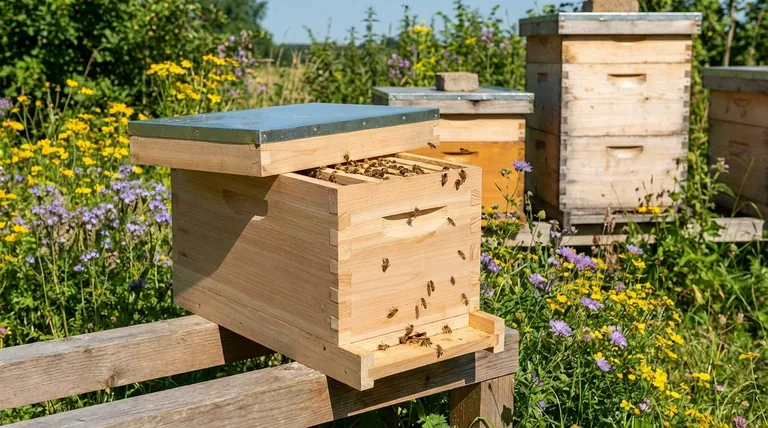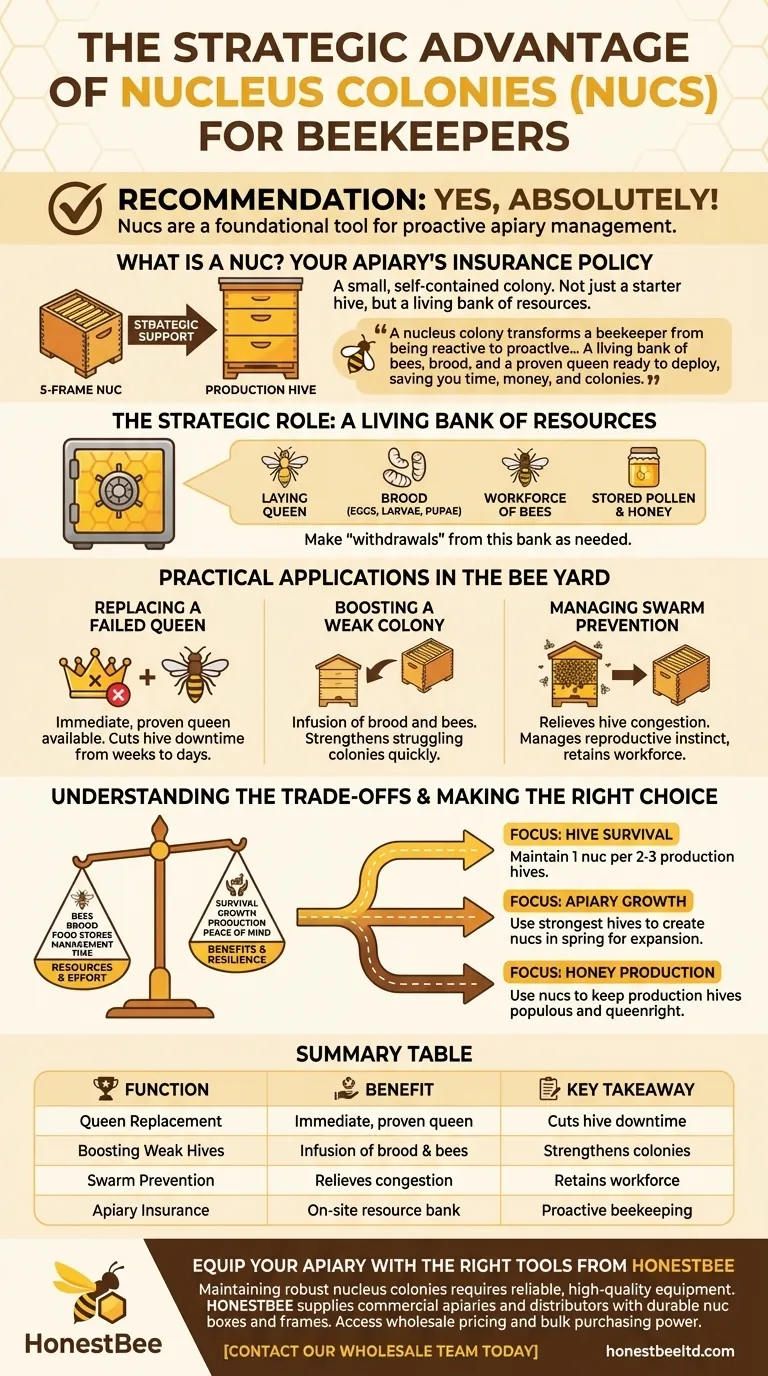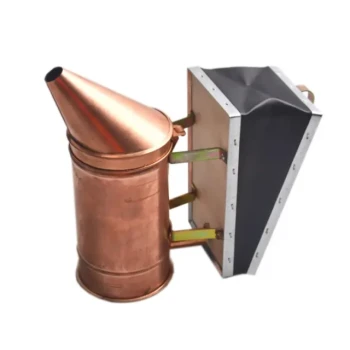Yes, absolutely. All beekeepers should maintain nucleus colonies, often called "nucs." They are a foundational tool for proactive apiary management, providing the resources and flexibility needed to solve the most common and costly problems a beekeeper will face. A nuc is not just a small hive; it is your apiary's insurance policy and on-site support system.
A nucleus colony transforms a beekeeper from being reactive to proactive. Instead of purchasing solutions when a crisis occurs, you have a living bank of bees, brood, and a proven queen ready to deploy, saving you time, money, and colonies.

The Strategic Role of a Nucleus Colony
A nuc is a small, self-contained honey bee colony, typically housed in a 4 or 5-frame box. While often used to start new hives, its greatest value lies in the strategic support it provides to your established, full-sized production hives.
A Living Bank of Resources
Think of a nuc as a bank account where the currency is bees. It holds a laying queen, brood in all stages of development (eggs, larvae, pupae), and a workforce of bees, along with stored pollen and honey. You can make "withdrawals" from this bank as needed.
The Ultimate Insurance Policy
The most frequent point of failure in a colony is the queen. If she dies, fails to lay well, or disappears, the hive is in jeopardy. Having a nuc with a healthy, laying queen on hand provides an immediate, proven replacement.
The Solution to a Declining Hive
When you notice a production colony is weak or its population is shrinking, a nuc provides the perfect solution. Instead of watching the hive slowly fail, you can intervene decisively by supplementing it with resources.
Practical Applications in the Bee Yard
Maintaining a nuc gives you powerful options for managing your apiary throughout the season. It turns potential disasters into minor inconveniences.
Replacing a Failed Queen
This is the most critical function of a nuc. If a production hive becomes queenless, it can take them over three weeks to raise a new one, mate her, and see her first eggs. During this time, the population declines and no honey is produced. With a nuc, you can simply introduce the new queen and her frame of brood, cutting that downtime to just a few days.
Boosting a Weak Colony
A hive might struggle to build up in the spring or may be weakened by disease. You can take a frame of capped brood, covered in nurse bees, from your strong nuc and place it in the weak hive. This provides an immediate infusion of population that can help the colony recover and defend itself.
Managing Swarm Prevention
When a powerful hive becomes overcrowded, it will prepare to swarm, costing you half your workforce. To relieve this congestion, you can pull a frame or two of brood and bees—and even the old queen—to create a new nuc. This satisfies the hive's reproductive instinct without losing a massive number of bees.
Understanding the Trade-offs
While immensely valuable, maintaining nucs is an investment of resources and effort. Objectivity requires acknowledging the costs involved.
The Commitment of Resources
The bees, brood, and food stores within a nuc could have otherwise been in a production hive contributing to a honey surplus. You are intentionally setting aside a portion of your apiary's total strength for insurance rather than production.
Additional Management Effort
A nuc is another colony that requires your attention. It needs to be inspected for health, fed if necessary, and managed for Varroa mites just like any other hive. This adds to your overall workload.
Sourcing a Quality Starter Nuc
If you are purchasing a nuc to begin, its quality is paramount. A low-quality nuc is a liability, not an asset. Ensure it has a healthy brood pattern of all ages, frames well-covered with worker bees, and visible stores of honey or pollen. Observe the seller's apiary to gauge their general bee husbandry practices.
Making the Right Choice for Your Apiary
Integrating nucs into your operation is a strategic decision that pays dividends in colony survival and peace of mind. Your approach can be tailored to your primary beekeeping goals.
- If your primary focus is hive survival and resilience: Maintain at least one nuc for every 2-3 production hives as your first line of defense against queen loss and winter die-outs.
- If your primary focus is apiary growth: Use your strongest hives to create nucs in the spring, allowing you to expand your apiary with your own local, adapted bee stock for minimal cost.
- If your primary focus is maximizing honey production: Use nucs to ensure your production hives are always populous and queenright, allowing you to instantly correct issues that would otherwise take them out of production.
Ultimately, keeping nucleus colonies empowers you to manage your apiary with confidence and control.
Summary Table:
| Function | Benefit | Key Takeaway |
|---|---|---|
| Queen Replacement | Immediate, proven queen available | Cuts hive downtime from weeks to days |
| Boosting Weak Hives | Infusion of brood and bees | Strengthens struggling colonies quickly |
| Swarm Prevention | Relieves hive congestion | Manages reproductive instinct, retains workforce |
| Apiary Insurance | On-site resource bank | Transforms beekeeping from reactive to proactive |
Equip Your Apiary with the Right Tools from HONESTBEE
Maintaining robust nucleus colonies requires reliable, high-quality equipment. At HONESTBEE, we supply commercial apiaries and beekeeping equipment distributors with the durable supplies needed to build and manage a successful nuc program.
Partner with us to:
- Source durable nuc boxes and frames designed for frequent inspections and resource transfers.
- Access wholesale pricing on essential equipment to scale your operation efficiently.
- Benefit from bulk purchasing power for all your commercial beekeeping needs.
Let HONESTBEE be your trusted partner in building a resilient and productive apiary. Contact our wholesale team today to discuss your equipment requirements and pricing.
Visual Guide

Related Products
- 5 Frame Wooden Nuc Box for Beekeeping
- HONESTBEE Professional Long Handled Hive Tool with Precision Cutting Blade
- HONESTBEE Advanced Ergonomic Stainless Steel Hive Tool for Beekeeping
- HONESTBEE Professional Entrance Bee Feeder Hive Nutrition Solution
- 5 Frame Langstroth Poly Nuc Corrugated Plastic Nuc Boxes
People Also Ask
- When can nucleus colonies (nucs) be created? Optimal Timing for Apiary Growth and Survival
- What is the most common type of standard nuc? The 5-Frame Nuc Explained
- What is the advantage of overwintering a nucleus? A Strategic Asset for Beekeeping Success
- What are the benefits of moving nuclei around the apiary? Master Strategic Hive Management
- What are the benefits of starting a new bee colony in a nuc box? Boost Colony Success with Efficient Beekeeping



















